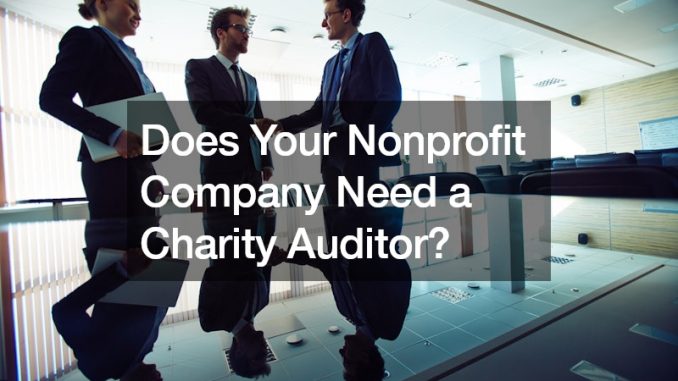

In the realm of nonprofit organizations, the term “audit” can evoke a mixture of emotions ranging from apprehension to confusion. However, understanding the role of a charity auditor and whether your nonprofit requires one is crucial for financial transparency, compliance, and organizational integrity. Let’s delve into the intricacies of audits for nonprofit companies and decipher whether your organization needs one.
Defining Charity Audits:
A charity auditor, often an independent accounting firm, examines the financial statements of a nonprofit organization to ascertain their accuracy and compliance with relevant regulations. These audits play a vital role in ensuring accountability, safeguarding assets, and maintaining the trust of stakeholders.
The Differences Between Nonprofit and For-Profit Audits
- Purpose:
- Nonprofit Audits: The primary purpose of a nonprofit audit is to provide assurance to stakeholders, including donors, grantors, and the public, regarding the organization’s financial health and adherence to regulatory requirements. Transparency and accountability are paramount, given the reliance on donations and grants.
- For-Profit Audits: For-profit audits primarily serve the interests of shareholders and investors. The focus is on assessing the company’s financial performance, profitability, and compliance with accounting standards to provide assurance to shareholders and potential investors.
- Financial Reporting Standards:
- Nonprofit Audits: Nonprofit organizations typically follow specific accounting standards tailored to the nonprofit sector, such as Generally Accepted Accounting Principles (GAAP) for nonprofits or International Financial Reporting Standards (IFRS) for nonprofits. These standards may include unique reporting requirements for contributions, grants, and restrictions on funds.
- For-Profit Audits: For-profit companies adhere to generally accepted accounting principles (GAAP) or international financial reporting standards (IFRS), which are tailored to the needs of investors and creditors. The focus is on accurately reporting revenues, expenses, assets, and liabilities to assess the company’s financial position and performance.
- Regulatory Compliance:
- Nonprofit Audits: Nonprofit organizations are subject to specific regulations and reporting requirements imposed by government agencies, such as the Internal Revenue Service (IRS) in the United States or the Charities Directorate in Canada. Nonprofit audits help ensure compliance with tax-exempt status regulations, reporting requirements, and applicable laws.
- For-Profit Audits: For-profit companies must comply with various regulatory requirements related to financial reporting, taxation, and industry-specific regulations. Audits help assess compliance with accounting standards, tax laws, and regulatory requirements applicable to the industry.
Audits: Mandatory or Optional?
Contrary to popular belief, not all nonprofit organizations require audits. The necessity of an audit depends on various factors such as legal requirements, organizational bylaws, contractual obligations, and internal policies.
Legal Considerations:
The legislation under which a nonprofit organization is established often dictates whether an audit is mandatory. For instance, incorporating legislation like the Societies Act, the Alberta Companies Act, or the Canada Non-Profit Corporations Act may stipulate audit requirements. It’s essential to review your organization’s incorporating legislation to determine if an audit is mandated.
Bylaws and Contractual Obligations:
Additionally, nonprofit organizations should examine their bylaws for any specifications regarding audits. Even if not mandated by legislation, bylaws may require an independent audit. Moreover, funding agencies may impose audit requirements as part of grant contracts, making audits obligatory for organizations seeking financial support.
Organizational Policies:
While not legally mandated, some nonprofits opt for audits as part of their organizational policies or best practices. These policies may be based on considerations such as organizational size, funding sources, stakeholder interests, and the complexity of financial affairs.
Navigating Audit Requirements:
In determining whether your nonprofit needs a charity auditor, thorough consideration of the aforementioned factors is essential. If audits are deemed necessary, proper preparation and communication with auditors are paramount for a smooth and effective audit process.
Preparing for a Charity Audit:
Preparing for a charity audit involves understanding the roles of various stakeholders, including the board of directors, management, and accounting staff. Clear communication and timely provision of necessary information and documents to auditors can streamline the audit process and contribute to its success.
Maximizing Audit Efficiency:
To ensure the audit report accurately reflects the organization’s financial standing, it’s essential to work closely with the charity auditor. Understanding the auditor’s expectations and providing comprehensive information can facilitate a thorough examination and timely completion of the audit.
Seeking Professional Guidance:
For nonprofit organizations navigating audit requirements and preparing for audits, seeking professional guidance can be invaluable. Seminars or workshops focused on audit processes and best practices can equip nonprofit leaders with the knowledge and tools needed to navigate audits effectively.
Conclusion:
While the prospect of a charity audit may evoke apprehension, understanding the necessity and intricacies of audits is essential for nonprofit organizations. By carefully considering legal requirements, organizational policies, and contractual obligations, nonprofit leaders can determine whether an audit is necessary for their organization’s financial transparency and compliance. Proper preparation and collaboration with charity auditors can ensure a smooth audit process and contribute to the organization’s overall integrity and accountability.
.
